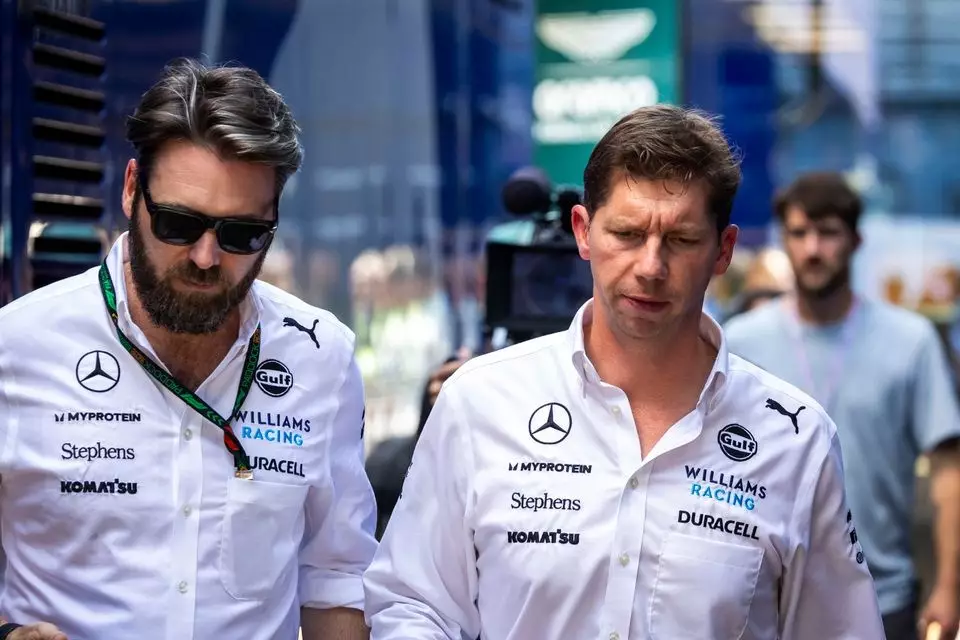The Williams Formula 1 team finds itself at a crossroads as it embarks on a journey towards significant regulatory changes set to take effect from the 2026 season. Team Principal James Vowles has openly acknowledged that the 2025 season will be a particularly challenging one for the British racing outfit, as they prioritize long-term gains over immediate results. This strategic pivot reflects a deeper understanding of the evolving landscape of Formula 1 and the necessity for teams to adapt to remain competitive.
Williams has faced a tumultuous period, struggling financially under the Williams family name and failing to finish in the top five of any race since the controversial Belgian Grand Prix in 2021. The new ownership under Dorilton Capital has provided a fresh financial outlook, enabling the team to invest in performance upgrades and infrastructure upgrades. Vowles’ candid reassessment of expectations for the upcoming season signifies a willingness to sacrifice short-term success if it means establishing a robust foundation for future competitiveness.
Starting in 2026, Formula 1 will undergo a significant overhaul, featuring changes such as reduced car dimensions, lower weight, and simplified aerodynamics. These alterations aim to enhance both safety and competitiveness within the sport. Vowles has indicated that while the team aims to make impressive strides, they are also cognizant of the potential setbacks they might encounter as they navigate this transition.
In an effort to position themselves strategically, Williams is prepared to accept a temporary retreat in its performance metrics. “2025 will be a struggle,” Vowles stated candidly. This admission underlines a significant shift in mindset, as many teams focus narrowly on immediate standings in the Constructors’ Championship rather than long-term strategy. By acknowledging that “it’s going to be a hard year,” Vowles is fortifying a strategy that embraces patience, learning, and carefully calculated risks.
Despite its struggles, the Williams team demonstrated resilience in the 2023 season, narrowly clinching seventh place in the Constructors’ Championship against AlphaTauri. The season featured a particularly vibrant moment at Monza and Baku, where drivers Alex Albon and Franco Colapinto showcased the team’s improved performance by finishing in the top eight. These gains come after Vowles made considerable efforts to alleviate the weight of the FW46, bringing it closer to competitive parity.
The team’s ability to leapfrog over rivals once again relies heavily on Vowles’ intent to harness knowledge gained from the last several seasons and apply it with distinct boldness. He expressed a commitment to “leaps in technology,” emphasizing not just incremental progress but rather dramatic improvements that set the groundwork for future performance. This sentiment echoes a broader theme within motorsport: that true innovation often arises from calculated failures.
Vowles advocates for a trial-and-error methodology in preparing for the new regulations. Accepting that mistakes will happen as Williams actively seeks bold technological advancements reveals an impressive strategic mindset. “In doing so, we’re going to trip ourselves up,” he indicated, highlighting that insights gained from missteps are invaluable to the learning process.
This year represents a unique opportunity for Williams. While other teams will also adjust to the new specifications, Williams’ foresight in prioritizing developments for 2026 over immediate prospects could yield meaningful advantages. As Vowles suggests, the key to future success lies not just in avoiding failures but in learning to embrace them, fostering a culture where innovation and adaptation take precedence.
As Williams prepares for inevitable challenges in 2025, Team Principal James Vowles remains steadfast in his vision for the team’s future. The clarity of focus on long-term goals versus immediate gains distinguishes Williams Racing in today’s highly competitive Formula 1 landscape. With strategic sacrifices being made, the culture of learning through experience may ultimately allow Williams to reclaim its position as a formidable competitor in the years to come. By embracing transformation, the team demonstrates resilience and an adaptable spirit, setting the stage for a hopeful resurgence when the new regulations come into effect.

